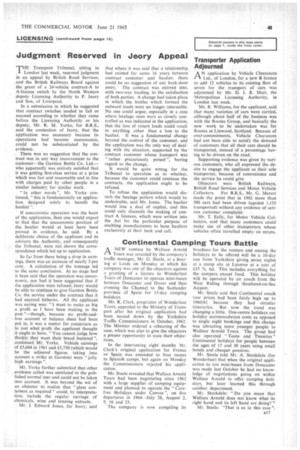Judgment Reserved in Jeory Appeal
Page 43

If you've noticed an error in this article please click here to report it so we can fix it.
'THE Transport Tribunal, sitting in 1 London last week, reserved judgment in an appeal by British Road Services, and the British Railways Board against the grant of a 24-vehicle contract-A to A-licence switch by the North Western deputy Licensing Authority to P. Jeory and Son, of Liverpool.
In a submission in which he suggested that contract switches tended to fail or succeed according to whether they came before the Licensing Authority or his deputy, Mr. R. M. Yorke, for B.R.S., said the contention of Jeory, that the application was necessary because its operations had become uneconomic, could not be substantiated by the evidence.
. There was no suggestion that the contract was in any way inconvenient to the customer—the Garston Bottle Co. Ltd.— who apparently was entirely satisfied that it was getting first-class service at a price which was fair and reasonable and in line with charges paid by other people in a similar industry for similar work.
"In other words", Mr. Yorke continued, "this is fundamentally an application designed solely to benefit the haulier ".
If uneconomic operation was the basis of the application, then one would expect to find that the uneconomic position of the haulier would at least have been proved in evidence, he said. By a deliberate choice of the applicant and its advisers the Authority, and consequently the Tribunal, were not shown the correspondence which led up to application.
So far from there being a drop in earnings, there was an increase of nearly 3 per cent. A calculation of the tonnage led to the same conclusion. At no stage had it been said that the operation was uneconomic, nor had it been suggested that if the application were refused, Jeory would be able to continue to give Garston Bottle Co. the service under the contract that it had enjoyed hitherto. All the applicant was saying was: "I want to make as big a profit as I have been making in the past "—though, because no profit-and. loss account or balance sheet had been put in, it was a matter for conjecture as to just what profit the applicant thought it ought to have. "You cannot judge how thickly they want their bread buttered ", continued Mr. Yorke. Vehicle earnings of £5,604 in 1961 and 15,750 (which would be the adjusted figures, taking into account a strike at Garston) were "jolly high earnings ".
Mr. Yorke further submitted that other evidence called was unrelated to the published normal user and could not be taken into account. It was beyond the wit of an objector to realize that "glass containers as required" could, by interpretation, include the regular carriage of chemicals, wine and tanning extracts.
Mr. J. Edward Jones, for Jeory, said
that where it was said that a relationship had existed for some 16 years between contract customer and haulier. there could be no suggestion of any back-door entry. The contract was entered into, with two-way loading, to the satisfaction of both parties. A change had taken place in which the bottles which formed the outward loads were no longer returnable. No one could argue, especially in a case where haulage rates were as closely controlled as was indicated in the application, that the loss of return loads could result in anything other than a loss to the haulier. It was a fundamental change beyond the control of the customer, and the application was the only way of dealing with the situation, supported by the contract customer whose transport was "rather precariously poised ", having regard to the change.
It would be quite wrong for the Tribunal to speculate as to whether, because the customer could continue the contracts, the application ought to be refused.
To refuse the application would disturb the haulage pattern which would be undesirable, said Mr. Jones. The haulier would lose a deal of capital, and this could only discredit the making of contract A licences, which were written into the Act for the particular purpose of enabling manufacturers to have hauliers exclusively at their beck and call.




















































































































